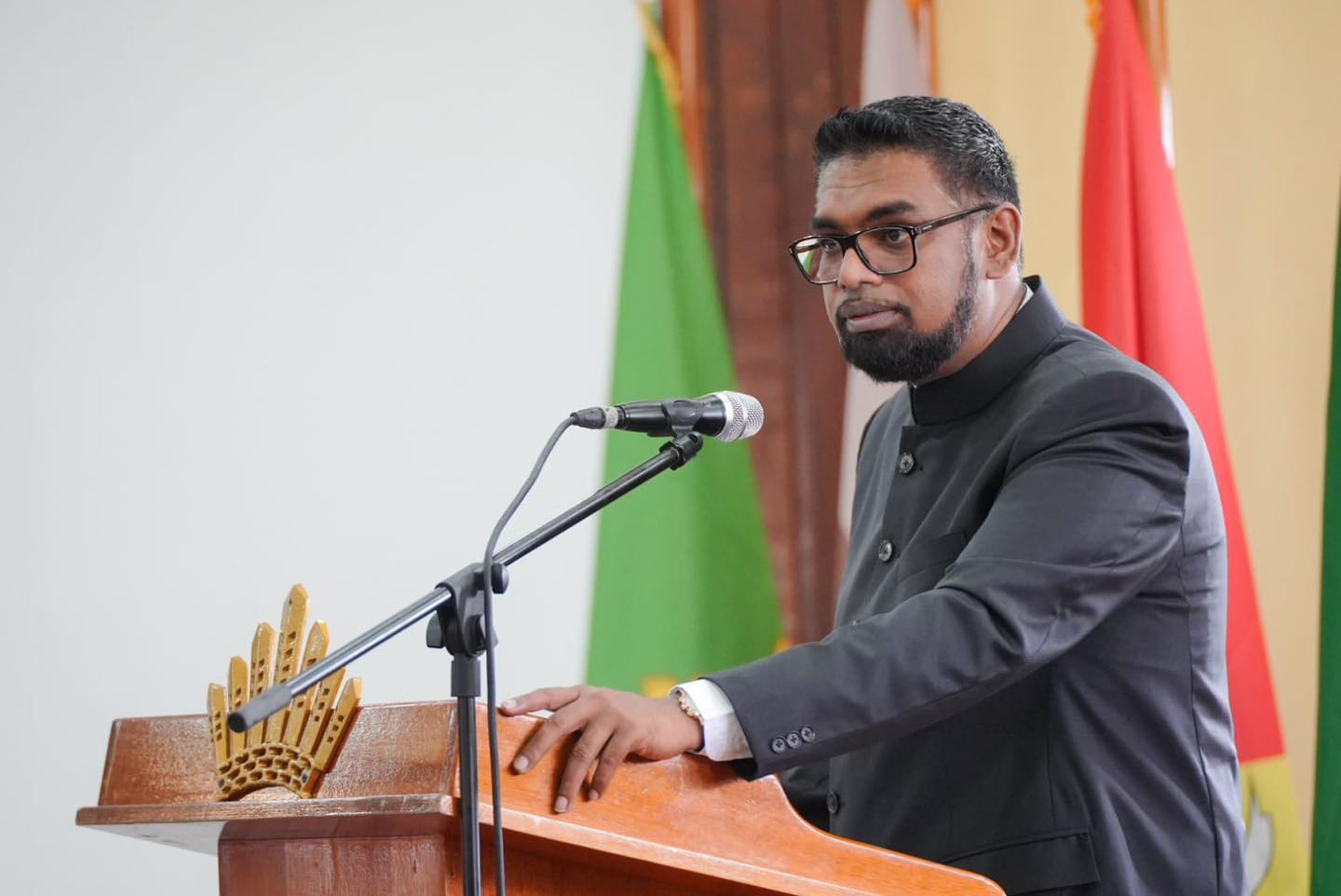Guyana’s President, Dr. Mohamed Irfaan Ali, sat down for an interview with BBC journalist, Stephen Sakur, on the sidelines of the Guyana Energy Conference and Supply Chain Expo in February. The discussion about Guyana’s oil got heated quickly as Ali defended government’s management of the sector and Guyana’s right to extract its resource wealth amid the energy transition.

The interview started on a quiet note, with the President explaining how far Guyana has come, from a troubled economic past to an “unbelievable transformation,” as Sackur put it.
Ali batted a question of whether oil and gas can overwhelm Guyana, noting that this newfound wealth is allowing the government to create a country that is globally competitive in many sectors.
“The buildout of the country from an infrastructural standpoint, a social standpoint, and importantly, building a healthcare and education system that is second to none is what is important to us,” Ali stated.
Guyana/Venezuela territorial controversy
On the territorial controversy with Venezuela, Ali raised that Venezuela once accepted the boundaries as stated in the 1899 Arbitral Award. He said the Bolivarian Republic participated in a delineation process with Guyana and Brazil, before raising a controversy many years later when Guyana gained independence from Great Britain in the 1960s.
Noting that Guyana has the unequivocal support of the international community, Ali said the government is working with partners who would not allow the region to be destabilized by Venezuela.
Then Sackur asked, “Have you seen the satellite imagery which shows that armored vehicles have gathered close to the border with Essequibo on the Venezuelan side, that they have armed coastal vessels gathered close to your waters?”
Ali responded: “If there is any breach in our territorial space, if there is any action by anyone to destabilize our country, or to invade in any, way, shape or form, that we will call upon every force and every friend to help us and to work with us to protect our territorial integrity.”
Guyana’s relationship with ExxonMobil
Sackur questioned why Guyana gave the oil major “such an extraordinarily sweet deal.”
The Production Sharing Agreement (PSA) governing the Stabroek Block was signed under the previous administration that was ousted in 2020 by the electorate. Ali noted as much, and when questioned on the government’s decision not to renegotiate it, asked: “What message are we going to send to international investors if you have a contract and then you just change [it]?”
Ali added further context to the government’s position, noting that Exxon came to Guyana to explore for oil and gas when there were not yet any proven reserves.
Doubling down on a challenge to the government’s position, Sackur said “You only get 2% royalty. It’s a 50% profit share after cost recovery, and the cost recovery – as I understand it – is going into the many billions of dollars already.”
The Guyana President conceded that the PSA was “a bad deal” but said Guyana cannot unilaterally change a contract. He told Sackur, following the question, that he would not say Guyana is being exploited by Exxon. He also said that the status quo with Exxon’s contract prevents the curtailing of the investment climate Guyana currently benefits from.
Ali further noted that the government has now established model petroleum agreements that get a bigger share of revenue from projects in other blocks.
The two had a back-and-forth over the terms of the Exxon deal, with Sackur pressing Ali, not only on the fiscal terms, but whether there are sufficient insurance safeguards to protect Guyana in the event of an oil spill. Ali noted that the government is working on improving the framework for these safeguards, including by drafting comprehensive oil spill legislation.
This is where the interview started to heat up.
Emissions from the development of Guyana’s oil
Sackur said that over the next one to two decades, with likely US$150 billion of oil and gas extracted from Guyana’s coast, there will be nearly 2 billion tonnes of carbon emissions generated from these activities.
“Let me stop you right there,” Ali responded. “Do you know that Guyana has a forest forever that is the size of England and Scotland combined? A forest that stores 19.5 gigatonnes of carbon?”
Then, Sackur asked if that gives Guyana the right to release all the carbon that will come from the development of Guyana’s oil.
The conversation got tense here, with Ali arguing against the global North lecturing Guyana on climate change. “I’m going to lecture you on climate change,” Ali told Sackur, reminding of Guyana’s forest conservation record. He said even at the height of Guyana’s oil sector, it will still be ‘net zero’.
The President told Sackur that a lot of hypocrisy exists in the world, with the developed world destroying much of global biodiversity while powering through with its industrial development.
“Are you in the pockets of those that have damaged the environment?” Ali questioned.
Sackur said, “… you know that your own country is one of the most vulnerable to climate change because most of your population lives below sea level.”
He added that Greenpeace said the world needs to keep the majority of the world’s remaining fossil fuels in the ground. But Ali was not having it.
“You just said that we are 6-feet below sea level. Who is going to pay for the infrastructure? Who is going to pay for the drainage and irrigation? Who is going to pay for the development and advancement of our country?” The President questioned.
Ali said Guyana has to develop and create opportunities for its people because no one is going to do it for the country.
Watch the full video below:



